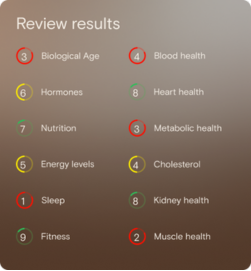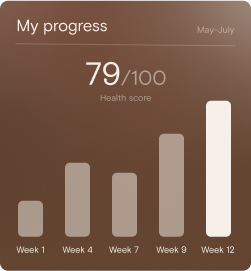Key Benefits
- Check the balance of 'bad' to 'good' cholesterol to gauge heart risk.
- Spot an unfavorable ratio that signals higher heart attack and stroke risk.
- Guide personalized lifestyle changes and statin decisions to lower lifetime heart disease risk.
- Clarify risk when individual LDL or HDL numbers seem borderline or conflicting.
- Protect fertility planning by flagging lipid imbalance common in PCOS and insulin resistance.
- Support pregnancy health by optimizing lipid balance before conception and during prenatal care.
- Track progress from diet, exercise, or medications by monitoring ratio trends over time.
- Best interpreted with a full lipid panel, non‑HDL cholesterol or ApoB, and risk factors.
Can Height Affect Your Health?
If You're on the Shorter Side
Research shows some interesting patterns for shorter adults. Some studies have found that shorter people may have slightly higher rates of heart disease, though the reasons aren't fully understood and may relate to genetic factors that influence both height and heart health.
The good news? Other research shows that shorter people often have excellent cardiovascular health, and many shorter individuals live long, healthy lives. What matters most for your heart health are the factors you can control—like staying active, eating well, managing stress, and not smoking.
If You're on the Taller Side
Taller people have their own health profile. Research suggests that for every 2.5 inches of height, the risk of dying from heart disease decreases by 6%, possibly because taller people often have larger hearts and lung capacity. However, studies have found that taller people have modestly increased risks for certain cancers, though the reasons aren't completely clear.
Taller individuals might experience more joint stress simply due to mechanics, but staying active and maintaining good posture can help manage this.
The key takeaway? Height is associated with different health patterns, but your lifestyle choices—exercise, nutrition, sleep, and stress management—have a much bigger impact on your overall health than your height ever will. Your height is just one small piece of your health puzzle, and it's the pieces you can control that make the real difference.
What Influences Your Height
Your adult height is primarily determined by genetics, with parental heights being the strongest predictors. However, environmental factors during crucial growth periods can significantly impact final stature.
Childhood nutrition plays a critical role, particularly adequate protein, calcium, and overall caloric intake during growth spurts. Chronic illnesses, hormonal disorders, or severe malnutrition during childhood can result in shorter adult height than genetic potential would suggest.
Growth hormone production, thyroid function, and puberty timing all influence final height. Environmental factors like chronic stress, poor sleep, or exposure to toxins during development can also affect growth. Once bone growth plates close in late adolescence, adult height is established and cannot be significantly affected from lifestyle factors.
Living Well at Your Height
Regardless of your height, focus on optimising the health factors you can control. Maintain a healthy weight appropriate for your frame, engage in regular physical activity suited to your body mechanics, and ensure proper nutrition to support your body's needs.
Understanding Your Height in Context
Healthcare providers use height measurements for numerous clinical calculations. Height combines with weight to determine BMI, influences ideal weight ranges, and factors into medication dosing and medical equipment sizing.
Height also contributes to risk stratification for various conditions. Insurance companies and epidemiological studies often incorporate height data when assessing health risks and life expectancy predictions.
References
- Silventoinen, K., Sammalisto, S., Perola, M., et al. (2003). Heritability of adult body height: a comparative study of twin cohorts in eight countries. Twin Research, 6(5), 399-408.
- Perkins, J.M., Subramanian, S.V., Davey Smith, G., & Özaltin, E. (2016). Adult height, nutrition, and population health. Nutrition Reviews, 74(3), 149-165.
- Silventoinen, K., Kaprio, J., Lahelma, E., et al. (2016). Genetic and environmental influences on height from infancy to early adulthood: An individual-based pooled analysis of 45 twin cohorts. Scientific Reports, 6, 28496.




















.png)
